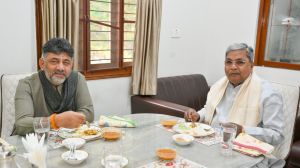Stay updated with the latest - Click here to follow us on Instagram
Days after winning Jnanpith,Shrilal Shukla passes away
Its rather difficult to talk about oneself, Shrilal Shukla,fumbling for words,once told an interviewer in a film made on him by the Sahitya Akademi.
Its rather difficult to talk about oneself, Shrilal Shukla,fumbling for words,once told an interviewer in a film made on him by the Sahitya Akademi. The reaction sums up the famously reticent writer who was frequently,but wrongly,described as a satirist on the basis of his Sahitya Akademi award-winning novel Raag Darbaari.
Former IAS officer and feted litterateur,Padma Bhushan Shrilal Shukla,86,passed away at Sahara Hospital in Lucknow on Friday. It was ironical that the man famous for his sharp commentary on governance and administration should receive his final recognition,the Jnanpith Award,on his deathbed.
There was a proposal from the state to hold a function at a five star hotel to felicitate him and present the memento and cash award. But we refused the offer and saved him the discomfort of being carried on a stretcher to be honoured for a stellar work (Raag Darbaari) 25 years too late, said his brother B S Shukla,83,at the funeral.
His astute understanding of the rural mileu came out of his experience of serving in the administration. I was part of the making of the great novel as he shared passages at the stage of writing, said Dauji Gupta,former mayor and a close friend of Shuklas.
Widely considered to be among the best Hindi novels of the last century with a grand national narrative,Raag Darbaari portrayed a feudal,crumbling Shivpalganj the archetypal village of the Hindi heartland with its politico-cultural tensions and administrative neglect. Shukla delved upon almost everything that was decadent in the system,but stopped short of making a moral statement.
The remarkable thing about Raag Darbaari is that he decried the system in spite of being an instrumental part of it, said another close friend of Shuklas,former DGP Mahesh Chandra Dwivedi,an author in his own right.
Shukla was born in 1925,graduated from Allahabad University,and was a UP PCS officer before being elevated to the IAS. His first novel,Sooni Ghati Ka Sooraj,published in 1957,made him the youngest Hindi writer at that time to win the Sahitya Akademi Award in 1970.
In Vishrampur ka Sant,Shukla offered a critique of the status of Gandhian values in post-Independence India through a decaying politician,who undergoes a change of heart in the end.
Despite being a bureaucrat,he was uninhibited in his works when it came to depict the moth-eaten system and its red tape. Hamare desh ka kanoon bahut pakka hai. Jaisa aadmi,vaisi adalat (our country has a very sound legal system the courts are just like the litigants), he wrote in one of his novels.
He refused plum postings in Delhi because he wanted to serve among his people, said Shuklas brother. He is the first from Lucknow to receive the Jnanpith… Sociologist Shyama Charan Dube had once said that study of the Indian society is incomplete without referring to Raag Darbaari,which was turned into a TV series for Doordarshan.
Besides the Jnanpith and Sahitya Akademi,Shukla won several awards for his contribution to Hindi literature,including the Padma and the Vyas Samman.
Just 10 days ago,on October 18,he was conferred the Jnanpith on his hospital bed by UP Governor B L Joshi. Shukla,who suffered from Parkinsons disease,had been undergoing treatment for a lung infection since October 16 at Sahara Hospital. The award was announced on September 19.







